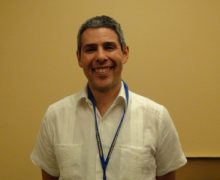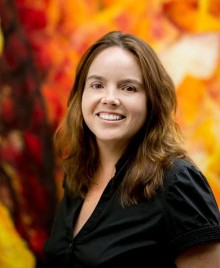Humanities grants
Two Wheaton professors—John Bezis-Selfa and M. Gabriela Torres—each have won support from the National Endowment for the Humanities (NEH) to pursue ongoing research and scholarship this summer.
The federal grants will allow Bezis-Selfa to continue research on the history of Latino voting rights in the United States, and it will enable Torres to extend her scholarship on the study of gender-based violence with other experts in the field.

The NEH is an independent federal agency created in 1965. It is one of the largest funders of humanities programs in the United States.
“NEH provides support for projects across America that preserve our heritage, promote scholarly discoveries, and make the best of America’s humanities ideas available to all Americans,” NEH Chairman William D. Adams said. “We are proud to announce this latest group of grantees who, through their projects and research, will bring valuable lessons of history and culture to Americans.”
An associate professor of history, Bezis-Selfa received a summer stipend from the NEH to support research for his new book project focused on the struggle of Latinos in the United States to earn and preserve the right to vote.
The summer stipend program, an intensely competitive program that awards grants to less than nine percent of applicants, will allow Bezis-Selfa to conduct two months of archival research, at university and state archives in Arizona and Texas. Ultimately, he aims to explore how Latino struggles to gain and exercise the right to vote have shaped conceptions of citizenship and Latinos’ place within the United States.
The topic seems to come directly from recent newspaper headlines and political debates, which have featured controversial claims about voter fraud during the presidential election, plans for building a border wall and disagreements over undocumented immigrants in the United States. However, Bezis-Selfa said that such questions have a long history.
“Latinos’ struggle for voting rights has deep roots in our nation’s history because Latinos have deep roots in our nation,” he said. “That struggle began almost as soon as Spanish-speaking peoples fell under the jurisdiction of the United States, especially after the conclusion of the U.S.-Mexico War in 1848 and the U.S. conquest of Puerto Rico in 1898.”
While the project represents a new scholarly focus for Bezis-Selfa on Latino history in the United States, it continues his interest in the movement of people, goods and ideas across borders and “the historical relationship between race, legal status, political economy and citizenship.”
In some sense, Latinos’ struggle for voting rights has been an argument about whether they can truly be responsible voters and citizens.
“At moments of political division and tension that belief has erupted into charges that Latinos, whether marching directly across the border to vote or already residing within the U.S., have swayed elections and fueled campaigns to target Latinos for disenfranchisement,” he said.
Like Bezis-Selfa, Associate Professor of Anthropology Gabriela Torres will receive support from the NEH this summer. The endowment’s funding will provide her with the opportunity to extend her work as an anthropologist who specializes in exploring the role of the state in sanctioning and facilitating gender-based and sexual violence. She was selected to participate in the NEH summer institute investigating the theme of Diverse Philosophical Approaches to Sexual Violence, which will be hosted by Elon College in North Carolina in June.

At the institute, Torres and her fellow scholars will draw upon philosophy “to explore the different meanings of sexual violence in distinct social contexts, diverse ways of framing the harms that sexual violence imposes, the relation (or lack of same) between sexual violence and other sexual acts, and the meaning of various forms of individual and collective responses (including the role of the state),” according to the NEH website.
The interdisciplinary nature of the institute complements Torres’ teaching and leadership at Wheaton, where she also serves as co-director of the Wheaton Institute for the Interdisciplinary Humanities and a collaborator in developing the college’s new Center for Teaching and Learning. Indeed, while the institute may lay the groundwork for new directions in her scholarship, the primary benefit of the two-week program will lie in broadening the foundation for teaching.
“Interdisciplinary teaching requires understanding the foundations of other disciplinary perspectives,” Torres said, noting that she approaches her work as a social scientist. “I have no prior familiarity with the philosophy on this topic. The summer institute will enable me to teach about sexual violence in a more interdisciplinary way.”